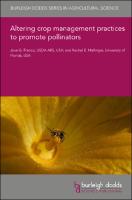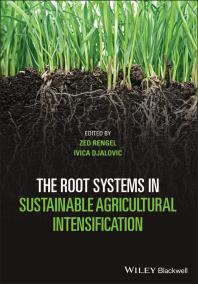
Library books are organised by call numbers on the spine of the books. Use the Library Catalogue to see if the item is available in the library.
Useful call numbers for Agricultural Science & Sustainability include the following:
 Search Library Catalogue
Search Library Catalogue
To find books and other items in the Library, search the Library Catalogue.
If your search retrieves too many results, look at the Refine your search options on the left of the screen to narrow your results.
You can apply multiple limits if you wish to get very specific results - select and apply each one in turn.
TUS Library provides access to thousands of eBooks in many subject areas. Our eBook are available on different platforms: EBSCO, EBook Central and ScienceDirect. You can access eBooks wherever and whenever you need them.
Explore eBook Collections guide to learn how to find and use eBooks.
 Alternating crop management practices to promote pollinators
by
Agricultural intensification, or the increase in crop production per unit of input or land area to meet the needs of a growing population, has resulted in a landscape dominated by large scale monoculture cropping. Pollinators, specifically, are impacted by the lack of diverse floral and habitat resources associated with this type of farming. Agriculture must develop practices that diversify the crop landscape and increase the availability of habitat and flowering resources to support these populations. In this chapter, we summarize the available literature on how the production space, i.e., within a crop production field, orchard, or pasture, can be more effectively managed to sustain pollinator populations. We report on various spatial and temporal approaches within the context of various cropping systems (row crops, specialty crops, perennial orchards, and perennial forage and pasture systems). Collectively, these approaches represent opportunities to re-introduce diversity into the agricultural landscape to benefit pollinators.
Alternating crop management practices to promote pollinators
by
Agricultural intensification, or the increase in crop production per unit of input or land area to meet the needs of a growing population, has resulted in a landscape dominated by large scale monoculture cropping. Pollinators, specifically, are impacted by the lack of diverse floral and habitat resources associated with this type of farming. Agriculture must develop practices that diversify the crop landscape and increase the availability of habitat and flowering resources to support these populations. In this chapter, we summarize the available literature on how the production space, i.e., within a crop production field, orchard, or pasture, can be more effectively managed to sustain pollinator populations. We report on various spatial and temporal approaches within the context of various cropping systems (row crops, specialty crops, perennial orchards, and perennial forage and pasture systems). Collectively, these approaches represent opportunities to re-introduce diversity into the agricultural landscape to benefit pollinators.
 Measuring the Effectivity of Environmental Law
by
Found on doab- Directory of Open Access Books. This book presents a new method for measuring the effectivity of national and international environmental law. It took four years of research and experimentation to develop a way to construct evidence-based legal indicators. The existing environmental indicators evaluate only statistical, scientific or economic data. With legal indicators, governments, parliaments and other public and private actors, including environmental NGOs, will be able to assess accurately and concretely, on a scientific basis, what the gaps, progress and setbacks in the implementation of international conventions and national laws are. The legal indicators will also serve as innovative tools for decision-making, in particular to carry out legislative reforms in full knowledge of the facts and not blindly, as well as to avoid regressions in environmental law. The mathematical method used makes it possible, through a questi onnaire addressing all the legal and institutional stages of the application of legal texts, to provide data highlighting both the points to be improved and the strengths of the application of the law. This essay is an update of a first book published in 2018 by the Institut de la Francophonie pour le développement durable. It is the result of a partnership between the International Centre for Comparative Environmental Law and the Normandy Chair for Peace.
Measuring the Effectivity of Environmental Law
by
Found on doab- Directory of Open Access Books. This book presents a new method for measuring the effectivity of national and international environmental law. It took four years of research and experimentation to develop a way to construct evidence-based legal indicators. The existing environmental indicators evaluate only statistical, scientific or economic data. With legal indicators, governments, parliaments and other public and private actors, including environmental NGOs, will be able to assess accurately and concretely, on a scientific basis, what the gaps, progress and setbacks in the implementation of international conventions and national laws are. The legal indicators will also serve as innovative tools for decision-making, in particular to carry out legislative reforms in full knowledge of the facts and not blindly, as well as to avoid regressions in environmental law. The mathematical method used makes it possible, through a questi onnaire addressing all the legal and institutional stages of the application of legal texts, to provide data highlighting both the points to be improved and the strengths of the application of the law. This essay is an update of a first book published in 2018 by the Institut de la Francophonie pour le développement durable. It is the result of a partnership between the International Centre for Comparative Environmental Law and the Normandy Chair for Peace.
Improving dairy herd health reviews key challenges in dairy herd health management, such as effective monitoring and diagnosis of infectious diseases, as well as recent developments in areas such as disease prevention and disease surveillance.
This book provides a comprehensive overview of pedology in Ireland. It describes the main soil types of the country, their functions, ecological use, and the conditions to which they were subjected associated with management over time.
Milk--"It does a body good." It's difficult to deny the truth of the American Dairy Council's former advertising campaign. From birth milk is the sustaining and essential food of all mammals. It is the first food we ever taste. And yet, despite that natural relationship to milk, the majority of the world's population cannot digest it in the form most often available to adults--cow's milk.

This handbook includes contributions from established and emerging scholars from around the world and draws on multiple approaches and subjects to explore the socio-economic, cultural, ecological, institutional, legal, and policy aspects of regenerative food practices.

Explore an in-depth and insightful collection of resources discussing various aspects of root structure and function in intensive agricultural systems The Root Systems in Sustainable Agricultural Intensification delivers a comprehensive treatment of state-of-the-art concepts in the theoretical and practical aspects of agricultural management to enhance root system architecture and function.
Sustainable Food Systems provides the readers with the insights on the various kinds of food systems that need to be taken up to ensure sustainability in the kind of food consumed by the people across the globe and the importance of sustainability in such a subject.

This book consists of 8 chapters. All the chapters focus on modern methods and techniques regarding reuse and treatment of agricultural wastewaters.
This book present innovative ways to conserve both quality and quantity.

This book addresses the economics of water pollution control and water pollution control policy in agriculture, with an aim towards providing students, environmental policy analysts, and other environmental professionals with economic concepts and tools essential to understanding the problem and crafting solutions that can be effective and efficient.
Advances in Agricultural Animal Welfare fully explores developments in the key areas of agricultural animal welfare assessment and improvement. Analyzing current topical issues, as well as reviewing the historical welfare issues, the volume is a comprehensive review of the field.
The only metric that tracks how much nature we have – and how much nature we use Ecological Footprint accounting, first introduced in the 1990s and continuously developed, continues to be the only metric that compares overall human demand on nature with what our planet can renew — its biocapacity — and distils this into one number: how many Earths we use.

Ecological Concepts and Environmental Science examines various aspects of environmental science including an extensive overview of ecology and related concepts.

Management of Ecosystems examines various aspects of ecosystem and its management. It includes definitions of ecosystem, characteristics of ecosystem and other related projects. Further, it comprises comparison of ecosystem and ecosystem-based management ecosystems, biological resources, and ecological integrity.
This book is a primer on the essential science for grasping the workings of climate change and climate prediction. It is accessible for readers with little to no background in science, with an emphasis on the needs of those studying sustainable development. John C. Mutter gives a just-the-facts overview of how the climate system functions and what we know about why changes occur.
Climate Science Communications: Effective Approaches to Fighting Climate Denial analyzes some of the communication strategies employed by deniers and the psychological mechanisms behind how they work. Several experts offer specific counter-strategies to change the conversation and foster meaningful societal change on global warming.
The Library, Technological University of the Shannon